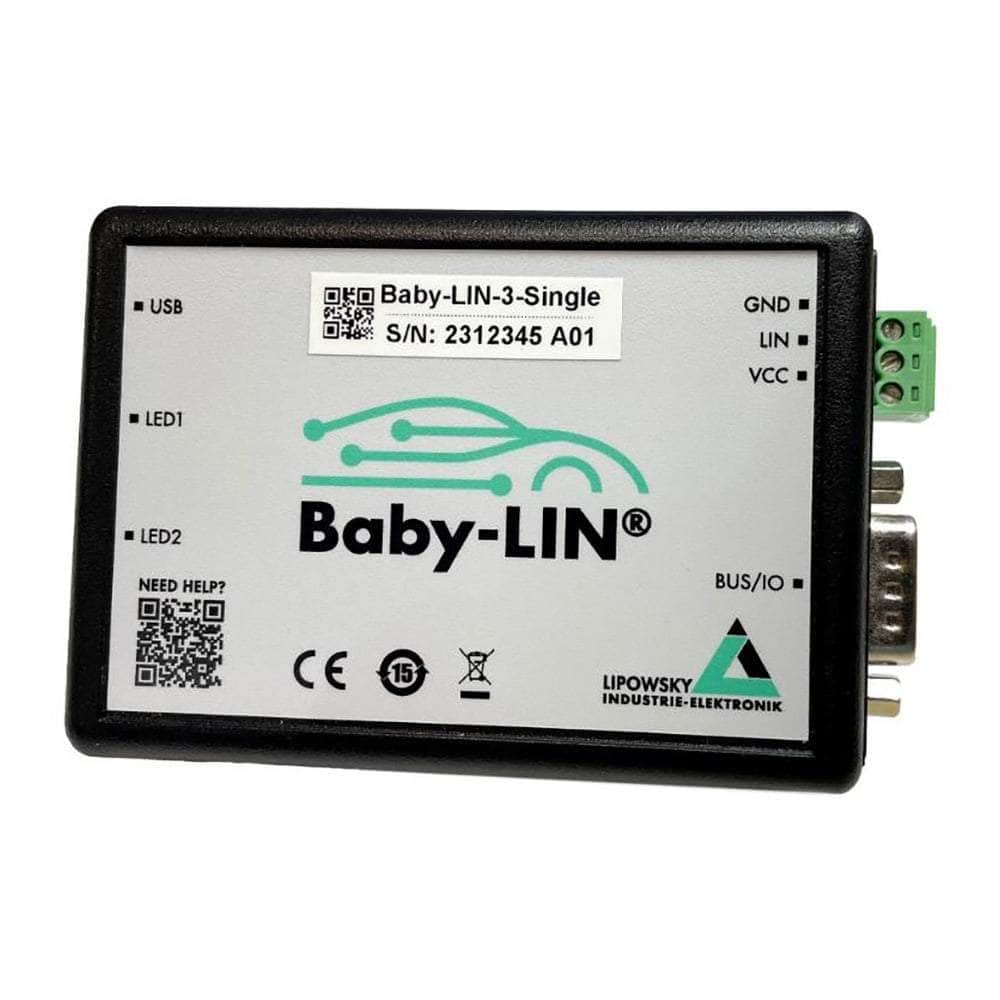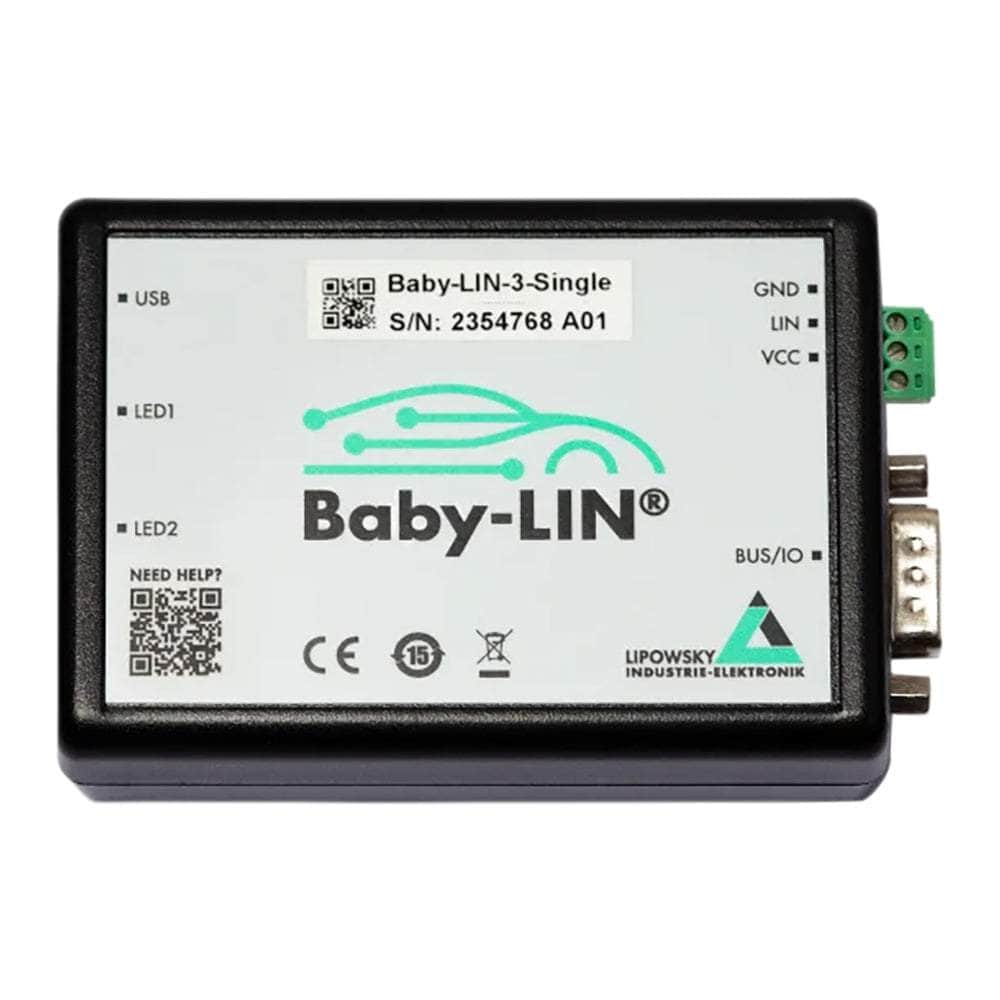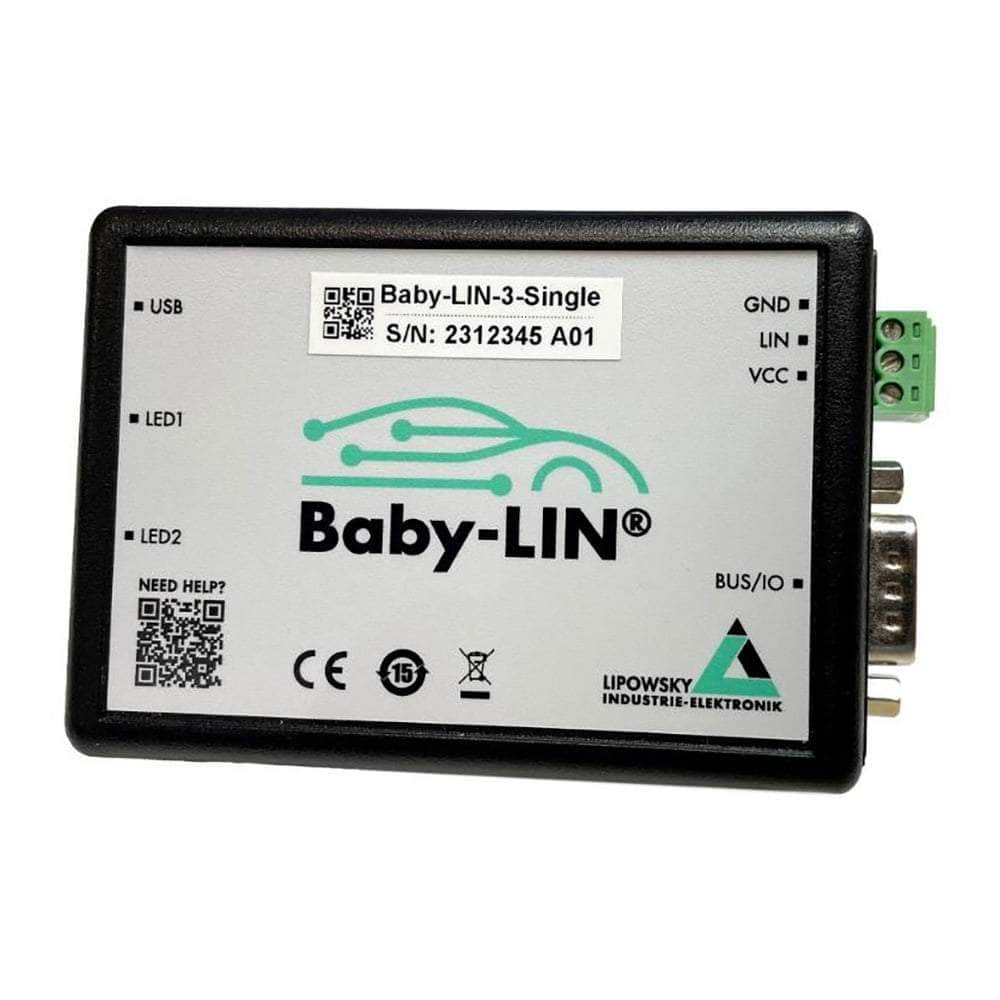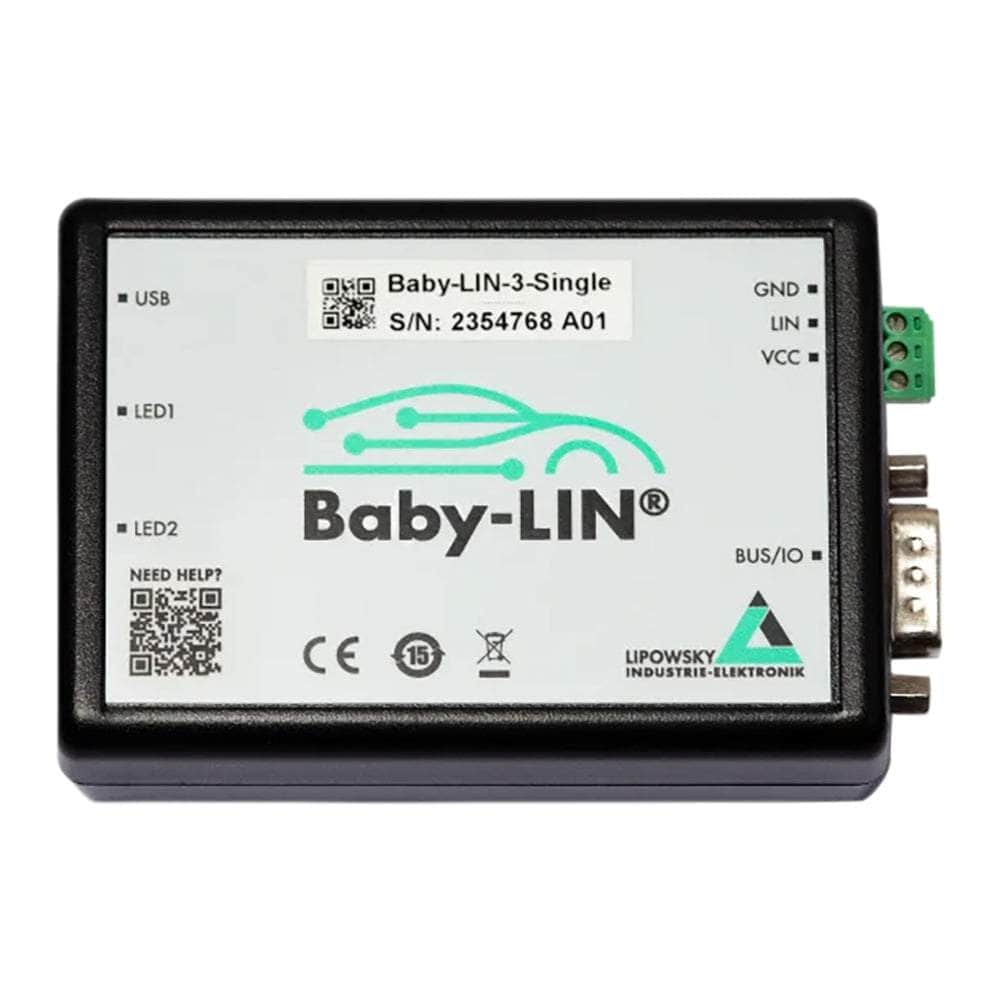

Key Features
Overview
Next Generation LIN Bus Simulation with Enhanced Performance
The Lipowsky Baby-LIN-3-Single represents the latest generation of LIN bus simulation devices, delivering exceptional performance for electronic design engineers working with automotive communication networks. This compact simulator provides comprehensive LIN bus control, monitoring, and simulation capabilities through a convenient USB interface.
Key Capabilities
Built around a powerful 480MHz Cortex M7 processor, the Baby-LIN-3-Single offers 60% faster performance than previous models, enabling efficient execution of complex session description files (SDF). The device supports all current LIN protocol versions from 1.2 to 2.2, including Cooling and SAE J2602 standards, with baud rates up to 115,200.
Professional Features
The simulator includes galvanic isolation between USB and LIN interfaces, preventing interference and ensuring reliable operation. Its standalone capability allows continuous operation without PC connection, making it ideal for endurance testing and production line applications. The device supports voltages from 8-26VDC with multiple connection options, including both 3-pin terminal and SUB-D9 connector.
Each Baby-LIN-3-Single includes a comprehensive LINWorks software suite licence, providing powerful tools for bus simulation, monitoring, and analysis. The device can function as a LIN master, slave, or passive monitor, supporting everything from single node simulation to complete bus emulation.
The Baby-LIN-3-Single is part of Lipowsky's comprehensive Baby-LIN family, which includes the dual-channel Baby-LIN-3-Dual and display-equipped Baby-LIN-3-RC variants for more complex applications.
Downloads
Why Engineers Choose The Lipowsky Baby-LIN-3-Single LIN Bus Simulator
Accelerated Development Cycles
Reliable Test Environment Creation
Complete Protocol Coverage
| General Information | |
|---|---|
Part Number (SKU) |
8001022
|
Manufacturer |
|
| Physical and Mechanical | |
Weight |
0.5 kg
|
| Other | |
Warranty |
|
HS Code Customs Tariff code
|
|
EAN |
5055383604586
|
Frequently Asked Questions
Have a Question?
-
What improvements does the Baby-LIN-3-Single have over the Baby-LIN-II?
The Baby-LIN-3-Single significantly outperforms the Baby-LIN-II while preserving full compatibility. It features a 480 MHz Cortex-M7 processor—60% faster than its predecessor—and expands memory to 32 MB RAM with 500 KB for session files versus 384 KB. Connectivity is modernised with high-speed USB 2.0 via USB-C and dual LIN connections (3-pin terminal plus SUB-D9), replacing the Mini-USB and single terminal of the Baby-LIN-II. Improved galvanic isolation enhances interference protection, and the larger enclosure supports better thermal performance and an extended operating range to +80 °C. Existing LDF/SDF files and workflows transfer seamlessly for an effortless upgrade.
-
I have been using the Baby-LIN-II for many years. Is the Baby-LIN-3-Single fully compatible with the Baby-LIN-II?
Yes, the Baby-LIN-3-Single maintains excellent compatibility with existing Baby-LIN-II workflows whilst offering significant improvements. Your existing LDF (LIN Description Files) and SDF (Session Description Files) created for the Baby-LIN-II will work directly with the Baby-LIN-3-Single without modification. The LINWorks software suite remains fundamentally the same, ensuring your established test procedures and custom applications continue to function seamlessly.
-
What voltage range does the device support for automotive applications?
The Baby-LIN-3-Single operates across the full automotive voltage range from 8-26VDC, accommodating both 12V and 24V automotive systems. This wide range ensures compatibility with passenger vehicles, commercial trucks, and industrial automotive applications without requiring additional power conditioning.
-
Can multiple Baby-LIN-3-Single devices be used simultaneously?
Yes, the LINWorks software and API support multiple connected devices, allowing engineers to test complex multi-node LIN networks or run parallel test scenarios. Each device operates independently whilst maintaining synchronisation capabilities for coordinated testing applications.
-
How does the Baby-LIN-3-Single compare to higher-end automotive test equipment?
While premium automotive test systems may offer additional protocols like CAN-FD or FlexRay, the Baby-LIN-3-Single provides equivalent LIN testing capabilities at a fraction of the cost. It delivers professional-grade performance, comprehensive protocol support, and reliability matching expensive alternatives for LIN-specific applications.
-
What is included with the LINWorks software suite?
The included LINWorks licence provides session configuration tools, LDF (LIN Description File) editing capabilities, bus monitoring software, data logging functions, and macro programming for automated test sequences. It also includes API libraries for custom application development in multiple programming languages.
-
What connection options are available for integrating with automotive systems?
The Baby-LIN-3-Single provides both a 3-pin screw terminal connector and a male SUB-D9 connector for maximum flexibility. This dual connectivity supports various automotive test setups, from breadboard prototyping to professional test bench integration with standard automotive connectors.
-
How does the galvanic isolation benefit automotive testing applications?
The galvanic isolation prevents electrical interference between the PC and target automotive systems, eliminates ground loop issues, and protects both equipment and test subjects from voltage spikes. This ensures reliable data capture and prevents damage to expensive automotive ECUs during development and testing phases.
-
What makes the Baby-LIN-3-Single superior to lower-cost LIN testing alternatives?
Unlike basic LIN interfaces, the Baby-LIN-3-Single offers galvanic isolation for reliable operation, a high-performance 480MHz processor for complex simulations, and comprehensive LINWorks software. It also provides both master and slave simulation modes, supports all LIN protocol variants, and includes professional features like extended voltage range support and multiple connection options.
-
Can the Baby-LIN-3-Single operate without a connected PC?
Yes, the device features standalone operation capability. You can program test sequences using the LINWorks software, upload them to the device, and then run continuous tests independently. This makes it ideal for endurance testing, production line applications, and long-duration automotive ECU validation scenarios.
-
What LIN protocol versions does the Baby-LIN-3-Single support?
The device supports all current LIN protocol versions from 1.2 through 2.2, including specialised automotive protocols such as Cooling and SAE J2602. It also supports extended baud rates up to 115,200 for non-standard applications requiring higher data throughput.


